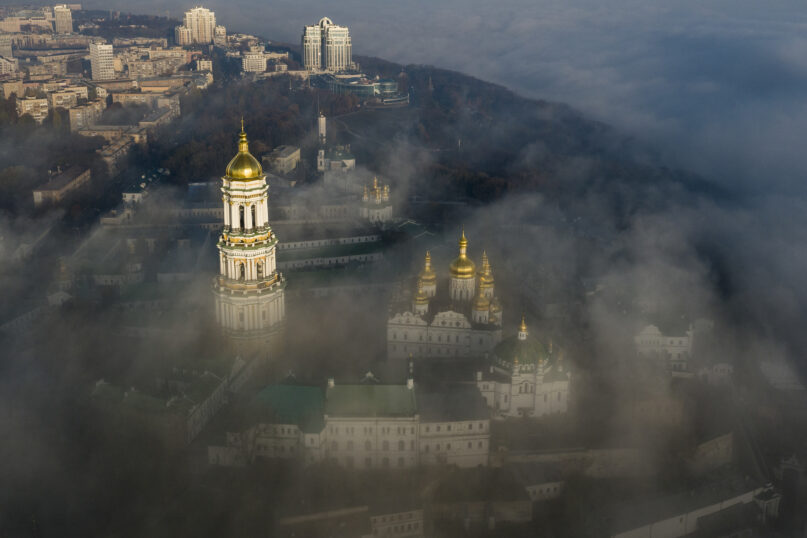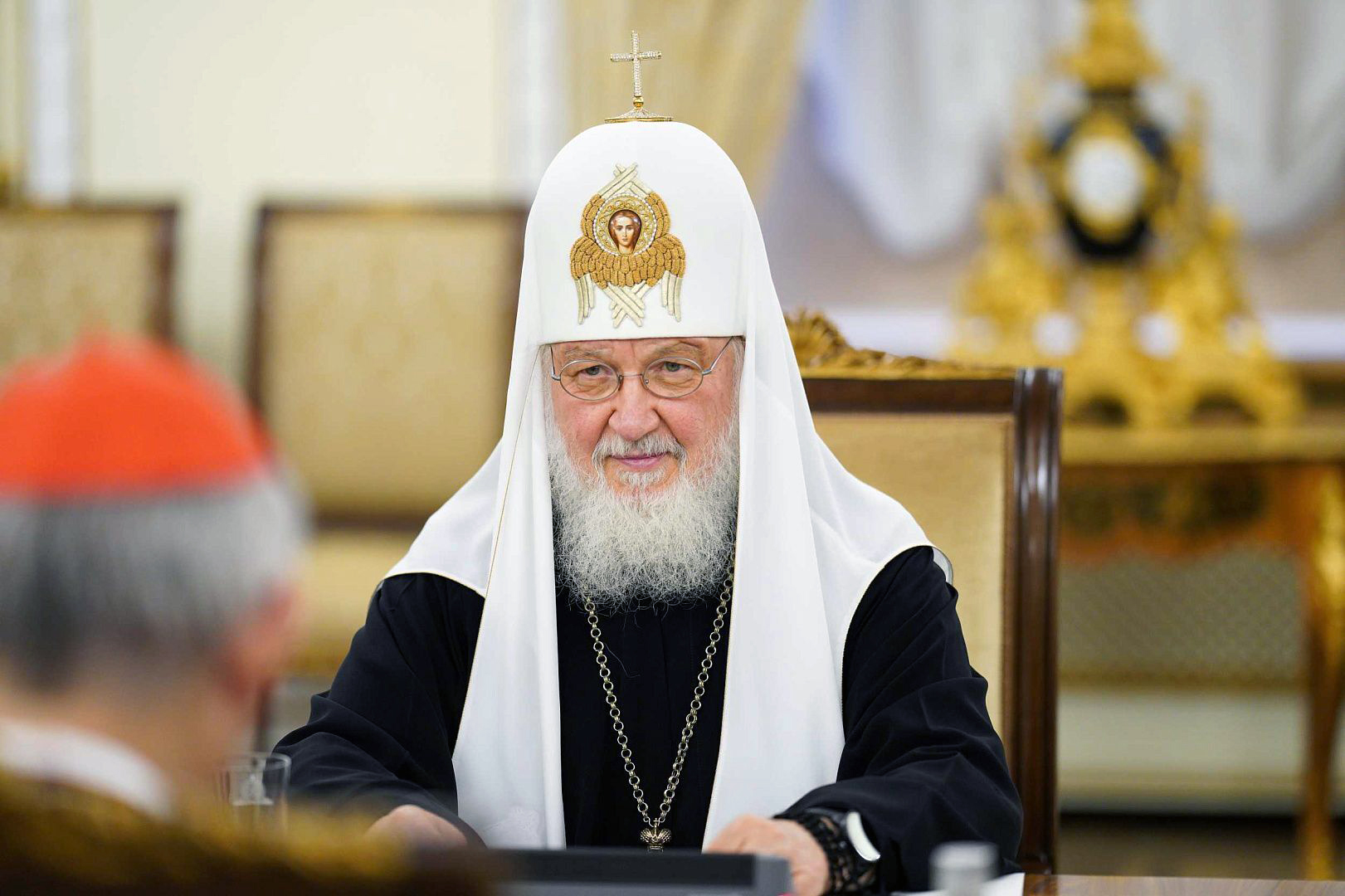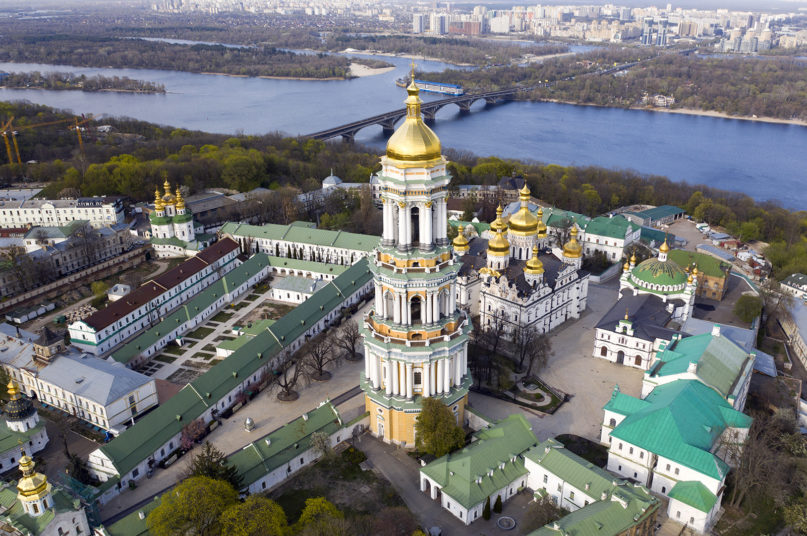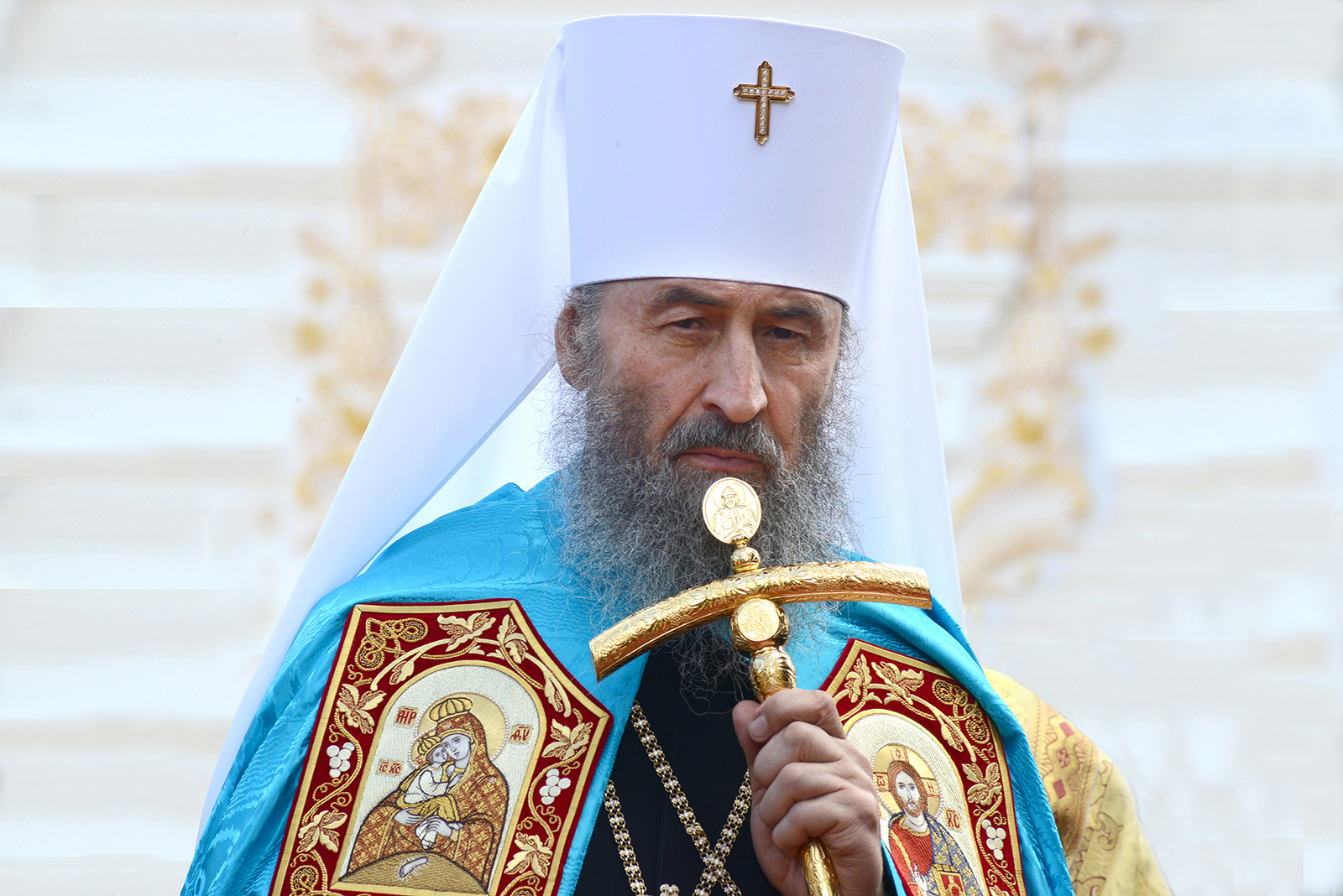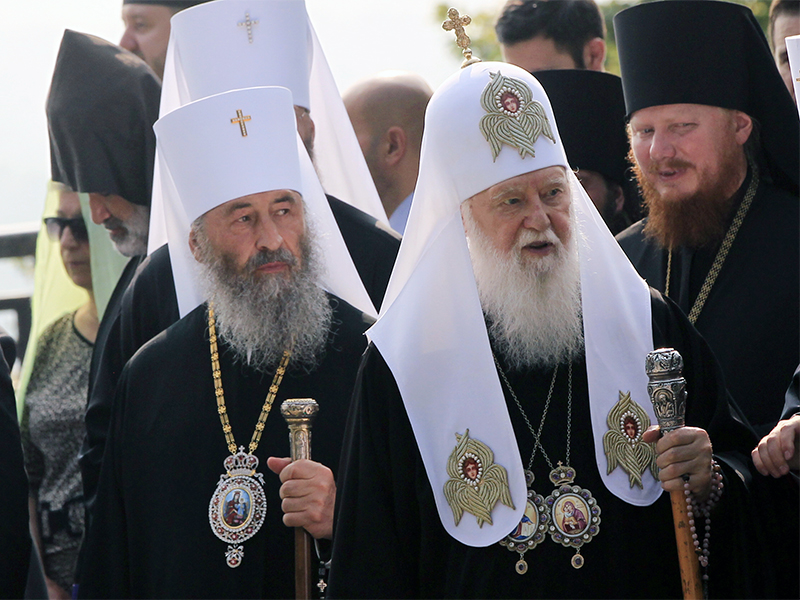PETER SMITH
Thu, October 19, 2023

The Monastery of the Caves, also known as Kyiv-Pechersk Lavra, one of the holiest sites of Eastern Orthodox Christians, is seen on March 23, 2023, in Kyiv, Ukraine. Ukraine's parliament overwhelmingly voted Thursday, Oct. 19, to advance legislation seen as effectively banning the Ukrainian Orthodox Church over its ties to Moscow, despite the church's insistence that it is fully independent and supportive of Ukraine's fight against Russian invaders.
Ukraine's parliament voted overwhelmingly Thursday to advance legislation seen as effectively banning the Ukrainian Orthodox Church over its ties to Moscow, despite the church's insistence that it is fully independent and supportive of Ukraine's fight against Russian invaders.
The Verkhovna Rada, or parliament, voted 267-15 on the measure, which requires further voting before it gets finalized and reaches the desk of President Volodymyr Zelenskyy. The legislation would prohibit the activities of religious organizations "that are affiliated with the centers of influence of a religious organization, the management center of which is located outside of Ukraine in a state that carries out armed aggression against Ukraine.”
That is seen as directly targeting the Ukrainian Orthodox Church, one of two rival Orthodox bodies in the country, where a majority of citizens identify as Orthodox.
The UOC has historically been affiliated with the Moscow Patriarchate. It declared its full independence from Moscow in May 2022, three months after the Russian invasion of Ukraine, and has repeatedly declared its loyalty and called on members to fight for Ukraine. Its leader, Metropolitan Onufry, said earlier this month that it's the “sacred duty” of every believer to defend Ukraine.
But many Ukrainians remain suspicious of the church and whether it has fully cut ties with Moscow Patriarch Kirill, who has strongly supported the war as a metaphysical battle against Western liberalism.
A government study earlier this year disputed the Ukrainian Orthodox Church’s declaration of independence. The State Service of Ukraine for Ethnopolitics and Freedom of Conscience said after examining the UOC’s governing documents that the church remains a structural unit of the Russian Orthodox Church.
Many lawmakers burst into cheers Thursday as the chairman of the Verkhovna Rada, Ruslan Stefanchuk, read out the tally of the vote. When Stefanchuk called for the voting, he urged the lawmakers to “have faith in the Lord God and love Ukraine.”
Parliament member Inna Sovsun commented on Facebook afterward: “So far this is only a first reading, but still a historic decision. … . It is extremely important to me to put an end to the (Russian Orthodox Church) activities in Ukraine.”
Ukraine's security service, the SBU, reported earlier this month it has initiated 68 criminal proceedings against UOC representatives since the war began, bringing charges such as treason, collaboration, aiding and abetting an aggressor country, public incitement to religious hatred, sale of firearms and the distribution of child pornography. According to the SBU, Ukrainian citizenship was revoked for 19 UOC representatives who held Russian passports and spread pro-Kremlin propaganda about the war..
UOC leaders emphasized that the Rada vote was preliminary and called on representatives to revise the measure. The church legal department said it violates the right to freedom of religion established in the nation's constitution and the European Convention on Human Rights.
“It is certain that the adoption of this draft law will indicate that human rights and freedoms, for which our State also fights, are losing their meaning,” the church legal department said in a statement.
A similarly named body, the Orthodox Church of Ukraine, received recognition as an independent church in 2019 by the Ecumenical Patriarch of Constantinople, but the UOC and Moscow have disputed his authority to confer that recognition.
The action comes amid an ongoing standoff at the historic Kyiv-Pechersk Lavra, a sacred Orthodox site in Kyiv where the government has sought to evict representatives of the Ukrainian Orthodox Church. The oldest parts of the large complex, known in English as the Monastery of the Caves, date back a thousand years.
Patriarch Kirill, at a gathering honoring Orthodox media, criticized Ukraine's stance on the church.
"The children of our church (have) become objects of oppression and even bullying for the fact that they are bearers of centuries-old Russian culture, which is inseparable from the heritage of Russian statehood," he said, according to the state-run news agency Tass. "The so-called abolition of Russian culture, this shameless slander and unpunished destruction of the Ukrainian Orthodox Church are ways to oppose and quarrel those who are related to the single spiritual and cultural heritage created by the peoples of historical Rus.”
___
AP journalists Hanna Arhirova and Nebi Qena in Kyiv, Ukraine, and Jim Heintz in Tallinn, Estonia, contributed.
___
Parliament passes bill on banning Russia-affiliated religious organizations in first reading
Dinara Khalilova, The Kyiv Independent news desk
Thu, October 19, 2023

The Verkhovna Rada, Ukraine's parliament, passed in its first reading on Oct. 19 a bill that could ban the Ukrainian Orthodox Church of the Moscow Patriarchate (UOC-MP), lawmakers reported.
The bill would prohibit the activities of any religious organizations affiliated with war propaganda or justifying the Russian invasion of Ukraine.
According to lawmaker Yaroslav Zhelezniak from the opposition party Voice, 267 members of parliament voted in favor of the bill, 15 against, and two abstained.
MP Iryna Herashchenko (from former president Petro Poroshenko's European Solidarity party) called the vote "historic."
"The Verkhovna Rada took the first step to expel Moscow priests from Ukrainian land… It (the draft law) is not about religion or church, but about protecting the national security of Ukraine," she said in a video message.
"It's about the fact that the church, which has a metropolis in Moscow, is not really a church, but a branch of the FSB (Russian security services). And it can be banned in court."
Read also: ISW: Russia ‘weaponizes religion’ to discredit Ukraine, achieve military goals
Ukraine has two main Orthodox churches — the Ukrainian Orthodox Church (Moscow Patriarchate) and the independent Orthodox Church of Ukraine (Kyiv Patriarchate).
The Moscow-controlled church (UOC-MP) has been accused of aligning with the Russian government during the war, which the church's leadership has denied.
Since November last year, Ukraine's law enforcement has raided multiple premises of the Ukrainian Orthodox Church, alleging that the church is at the heart of "subversive activities by Russian special services."
The Ukrainian government evicted the UOC-MP from the Kyiv Pechersk Lavra and has brought charges against church leaders for spreading pro-war propaganda.
54% of Ukrainians believe the UOC-MP should be banned, according to a survey conducted by the Kyiv International Institute of Sociology.
Ukraine's parliament backs ban on Russia-linked church in initial vote
Reuters
Updated Thu, October 19, 2023


Believers pray while they block an entrance to a church at a compound of the Kyiv Pechersk Lavra monastery in Kyiv
KYIV (Reuters) -The Ukrainian parliament gave initial approval on Thursday to a law that would ban the Ukrainian Orthodox Church after Kyiv accused it of collaborating with Russia following last year's invasion.
The UOC has historic links with Moscow, but says it is no longer aligned with the Russian Orthodox Church. It denies the charges leveled at it by Kyiv and said the draft law would be unconstitutional.
Yaroslav Zheleznyak, a member of parliament, said on the Telegram messaging app that deputies had voted to support the bill in its first reading. It has to be backed in a second reading and approved by the president to go in to force.
The law would ban the activities of religious organisations affiliated with centres of influence "in a state that carries out armed aggression against Ukraine", and such activities could be terminated by a court of law.
Another lawmaker, Iryna Herashchenko, said the vote was a step towards removing "Moscow priests from the Ukrainian land".
The head of Russia's Orthodox Church, Patriarch Kirill, appealed to Orthodox and other churches to do what they could to stop Ukraine's action before the bill became law.
"I ask you to take all measures to prevent the continuation of the mass infringements of religious rights of the Ukrainian Orthodox Church," Kirill said in the appeal, which appeared on a church website. It was also addressed to U.N. Secretary General Antonio Guterres and other figures.
The UOC said the draft law, one of several similar bills registered in parliament, did not comply with the European Convention on Human Rights or Ukraine's constitution.
Describing itself as an "independent and separate church", the UOC accused Kyiv of trying to pass it off as affiliated with the Russian Orthodox Church and portraying its Ukrainian clergymen and believers as "agents of the Russian Federation".
An independent Orthodox church was founded in Ukraine soon after independence from Soviet rule and has long competed for adherents with the Russia-linked church. It only received formal recognition from the world Orthodox hierarchy in 2018.
Ukrainian authorities and many people in Ukraine had for years seen the UOC as loyal to Moscow, and cracked down on the church after Russia's February 2022 invasion. Tensions have surfaced across the country.
A government commission has ruled the UOC is still canonically linked to Russia despite the church declaring that it cut ties with the Russian Orthodox Church in May 2022.
UOC Metropolitan Pavlo has been notified he is suspected of inciting inter-religious hatred and distributing materials justifying Russian aggression. He has denied the accusations.
Ukraine's Security Service said on Thursday 68 criminal cases, including accusations of treason, had been initiated against UOC representatives since Russia's invasion.
Analyst Volodymyr Fesenko said a ban on the UOC could be challenged in Ukraine and at the European Court of Human Rights. Fesenko suggested the church could register as a new entity with "no reference whatsoever to canonical ties" with Russia.
(Reporting by Yuliia Dysa and Max Hunder, Editing by Timothy Heritage, Ron Popeski and Lincoln Feast.)
Kyiv a step closer to banning Ukrainian Orthodox Church
Kristina Harazim
Thu, October 19, 2023

Ukraine’s lower house of parliament has passed a bill in the first of two required readings that would ban religious organisations and churches with alleged ties to Russia or in favour of its invasion of Ukraine.
Kyiv accuses the Ukrainian Orthodox Church (UOC) specifically of collaborating with Russia after its invasion of the country in 2022.
The bill was backed by 267 deputies and opposed by 15. It will become law if it passes a second reading and is signed by Ukrainian President Volodymyr Zelenskyy.
Ukrainian MP Inna Sovsun praised the vote as "extremely important".
"So far, this is only the first reading but it is still a historic decision," she said on social media. "In order to defeat the aggressor, we need to think asymmetrically and leave no room for Russia to harm us," she added.
Ukraine war: Kyiv security service sanctions 10 pro-Russian Orthodox priests
Moscow-affiliated branch of Ukrainian Orthodox Church cuts ties over war
Leaders of the UOC declared the church's independence from Moscow last May over Russia’s invasion of Ukraine.
The UOC said the proposed ban violated the European Convention on Human Rights which guarantees freedom of religion.
"Undoubtedly, the adoption of this draft law will indicate that human rights and freedoms, for which our state is also fighting, are losing their meaning," it said in a statement.
The proposed ban has been controversial in Ukraine, where some parishioners still attend churches linked to the Moscow Patriarchate.
Russia has described Kyiv's treatment of the church as religious persecution.
A date has not been set for the second reading of the bill.
SBU: Russian Orthodox Church runs private military companies to train fighters for Ukraine deployment
Thu, October 19, 2023

The Kremlin-linked Russian Orthodox Church is building and running private military companies (PMC), which recruit and train fighters for deployment in Ukraine, the Security Service of Ukraine (SBU) reported on Oct. 19.
The Church receives funding for these activities from financial and industrial groups close to Russian President Vladimir Putin, the SBU said. These funds are reportedly donated as "charitable contributions" for "construction of churches."
One example of a church-run PMC named by the SBU is the St. Andrew's Cross organization based in the Kronstadt Naval Cathedral in northwestern Russia.
The Russian news outlet Bloknot reported on the St. Andrew's Cross's activities last year, calling it "the first PMC under the Russian Orthodox Church." The group was reportedly set up in 2017 to provide military training for other mercenary companies' recruits.
The cathedral's abbot Alexey denied in a comment for Russian media that the St. Andrew's Cross would be a mercenary company, saying it only teaches skills to youth and adults for future military service.
According to the SBU, the Kronstadt-based PMC is recruiting local parishioners, primarily those with military experience, and providing them with training for combat deployment in Ukraine.
The instructions are carried out on the cathedral's grounds or in specialized training facilities in cooperation with Russian special services, the SBU said.
Despite being illegal in Russia, PMCs are widely used by the Kremlin for war efforts in Ukraine and to promote Russian interests in other regions of the world, such as Africa.
The most notorious group is the Wagner Company, set up by now-deceased Yevgeny Prigozhin and Dmitry Utkin. Following their deployment on Ukraine's eastern front, Wagner fighters launched a short-lived uprising against the Russian government in June.
Read also: Prigozhin’s death latest in a series of unsolved murders in Putin’s Russia. What’s next?
Russian Church creates "Orthodox private military companies" for war in Ukraine
Ukrainska Pravda
Thu, October 19, 2023

The Russian Orthodox Church creates its own private military companies on the territory of the Russian Federation. These groups engage in the recruitment and combat training of mercenaries among believers for the war against Ukraine on the instructions of the Ukrainian Orthodox Church of the Moscow Patriarchate (UOC-MP).
Source: Security Service of Ukraine (SSU)
Details: The Security Service has documented that one such private military company, St Andrew's Cross, operates out of the Kronstadt Naval Cathedral in St Petersburg.
Reportedly, its representatives are recruiting believers for service in the occupation forces within the walls of the religious institution.
During the selection of potential candidates, the preference is given to men who have already served in the military units of the aggressor country and have combat experience.
They undergo military-tactical and fire training under the guidance of instructors from the Russian special services after enlisting in the ranks of the private military companies.
Their organisers conduct training of recruits exclusively within the cathedral's walls, as well as on special training grounds to disguise combat training.
Quote: "It has been established that the financing of such private military companies is carried out by representatives of the financial and industrial groups of the aggressor country close to the head of the Kremlin. The money goes to the accounts of the Russian Orthodox Church in the form of charitable contributions and donations for the ‘construction of temples’," the SSU said.
The Security Service conducts complex measures to establish all the circumstances of the exposed crimes and bring the culprits to justice on the basis of documented facts.
Background: The Russian Orthodox Church supports Russia's aggression against Ukraine. Even last year, Moscow Patriarch Kirill told believers that death in the war against Ukraine "cleanses away all sins".

